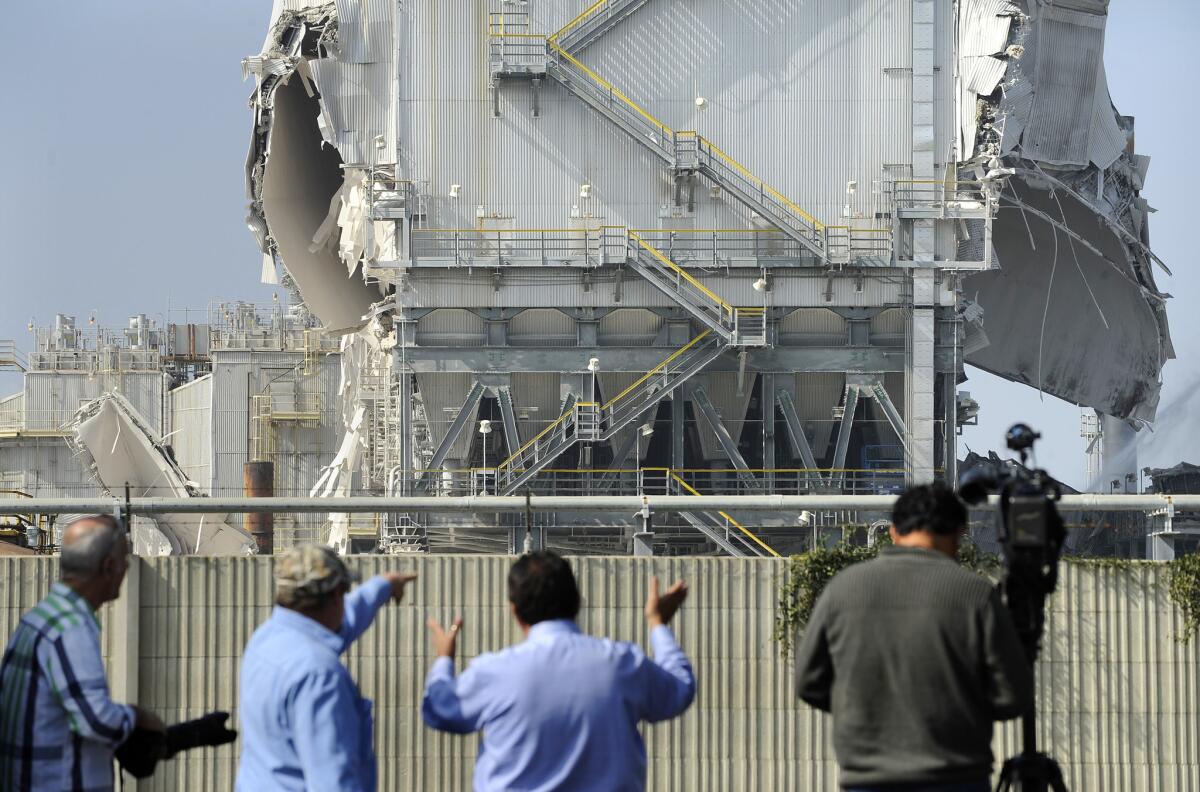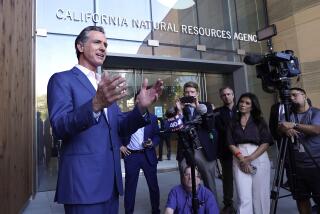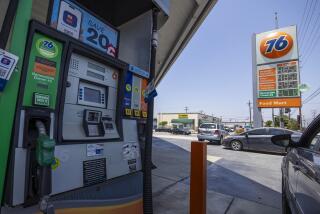Refiners and industry group refuse to meet about California gas prices

An explosion at the Exxon Mobile refinery in Torrance damaged a pollution control system and forced the plant to reduce operations to 20% of normal production.
An advisory committee to the California Energy Commission wanted to discuss the causes of the high gasoline prices in the state this summer during a workshop Tuesday -- only the oil refiners and their association refused to show.
Severin Borenstein, chairman of the Petroleum Market Advisory Committee, drafted a series of questions as part of scheduled meeting on California’s gasoline prices this year, which in the Los Angeles region reached as much as $1.50 more than the national average.
A major contributing factor to the high gasoline prices has been the low production at the Exxon Mobil Torrance refinery, which was damaged in a February explosion. The plant, which normally accounts for 10% of the state’s capacity and 20% in Southern California, has operated at less than 20% of normal production since the explosion.
“We are tasked with understanding and advising on California’s volatile gasoline prices,” Borenstein said. “We are holding a workshop ... to delve into why California’s gas prices have been so high compared to the rest of the country since the Exxon refinery fire in February, and why this relative price spike has lasted for seven plus months instead of the usual one to two.
“Unfortunately,” he added, “the in-state refiners and [Western States Petroleum Assn.] are declining to participate.”
Tupper Hull, a spokesman for the Western States Petroleum Assn., said the committee already has received “comprehensive briefings by [energy commission] staff regarding the California fuel markets, including the factors that contribute to disruptions in that market and higher prices for gasoline and diesel fuel in California compared to much of the rest of the nation.”
In addition, Hull said the commission receives large volumes of data from fuel refiners and distributors in California on all aspects of refining, marketing and distribution of petroleum products.
“Much of that information,” Hull said, “is sensitive from a competitive perspective and therefore must be kept confidential under the Petroleum Industry Information Reporting Act of 1980.”
Michael Barr, the lawyer for the petroleum group, wrote to Borenstein in an Oct. 8 letter that, “while the [Western States Petroleum Assn.] and its members have a long history of working cooperatively with the [energy commission] -- and we hope to continue to do so -- WSPA is not in a position to respond to these issues.
“As you know, WSPA is a nonprofit trade association representing 25 companies, many of whom are market competitors,” Barr said. “WSPA has no specific information about supply chain disruptions or pricing behavior unique to specific members or market participants.”
Barr urged Borenstein to consult the organization’s actual members.
But Borenstein said the refiners themselves also refused to appear at the meeting.
A fact sheet that Borenstein drafted for the meeting noted that in most of the decade prior to 2015, gasoline prices in California averaged 31 cents a gallon more than the national average.
That, he said, was in line with the state’s taxes and environmentally friendly blend of gasoline that can’t be produced everywhere.
But the average, Borenstein said, masks fluctuations that reached as high as 81 cents a gallon.
Then in January, gasoline fell under the state’s cap and trade program, which added about 10 cents to the previous average.
“With this extra cost, one would expect that California retail gasoline prices should now average about 40 cents above national average,” Borenstein wrote.
The actual average reached 42 cents above the national average, until the Feb. 18 explosion at the Exxon Mobil refinery in Torrance.
Through Sept. 30, Borensetin noted that California’s average gasoline price remained 67 cents more than the national average, according to the American Automobile Assn.
The lack of participation in the workshop drew strong criticism from advocacy group Consumer Watchdog, which regularly challenges the oil refinery industry.
Jamie Court, president of Consumer Watchdog, sent a joint letter with billionaire Tom Steyer to state lawmakers, noting:
“It’s outrageous that the oil industry would refuse to answer the $550 million extra California consumers were forced to pay in February for their gasoline above the U.S. average, particularly as the hearings proved the oil companies were the ones profiting from the California price spike,” the letter said.
The refineries’ gross profits, the amount they collect on a gallon of gasoline, was the highest on record since the California Energy Commission began collecting data in 1999, according to Gordon Schremp, a senior fuels specialist at the energy commission. The record $1.61 was set during the week of July 13, when gasoline prices reached as high as $5 a gallon in downtown Los Angeles.
For more energy news, follow Ivan Penn on Twitter: @ivanlpenn
More to Read
Inside the business of entertainment
The Wide Shot brings you news, analysis and insights on everything from streaming wars to production — and what it all means for the future.
You may occasionally receive promotional content from the Los Angeles Times.











